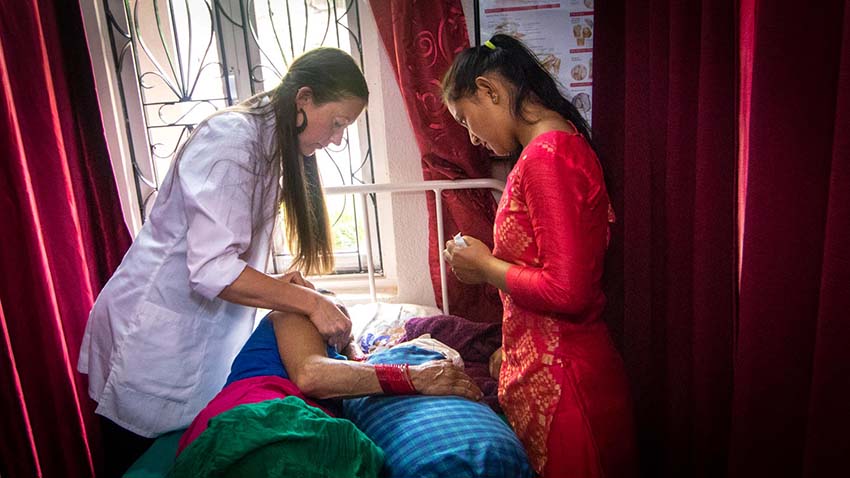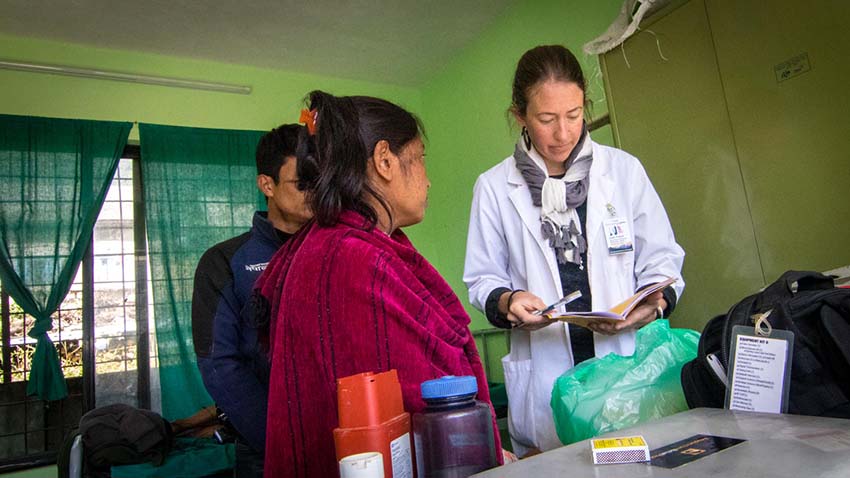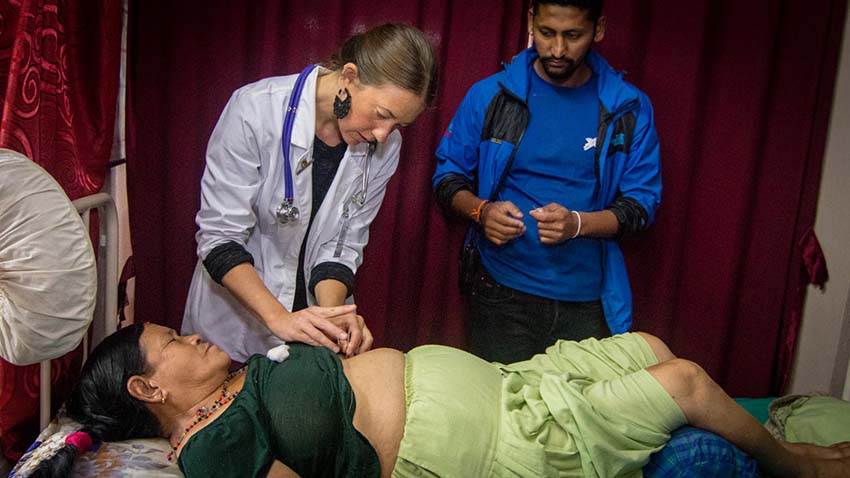
I looked down to check that I had everything. I wore my white lab coat, new name tag, and had pens in my pocket. My supplies were all laid out for the day, so familiar, and yet the surroundings quite new; the clinic’s dark red curtains, the colorfully-woven stools, shelves of Chinese herbs, the sound of patients speaking Nepali, and simple beds with turquoise sheets. I reassured myself that there was nothing to be nervous about. I had been preparing for this for so long. Besides, I had done this before, hadn’t I? Some elements of my first day at the Bajrabarahi clinic in Nepal stand out in my memory. I keenly remember my apprehension as patients were funneled in to sit on the plastic lawn chairs and waited expectantly while taking in my appearance. I wondered if I would know what to do. Would I be able to help them? I had so many questions and I often still do.
Nothing could have prepared me for the transition into treating patients in Nepal. At first it felt like chaos. There were often people waiting to be seen both inside the small work space and outside, people talking loudly, coughing, spitting, laughing, and people looking through the windows watching me work. My interpreter and I sat on low stools in front of patients and tried to make sense of each case over noise, language and cultural barriers, and with no privacy whatsoever. I felt the weight of time constraints and the needs of many waiting patients. I sat all day in a riot of stimulation and found that my own expectations were surging. I began to realize that my mind was occupied with expectations of myself to make good assessments, catch red flags, establish rapport, and provide healing treatments. I even began to notice that I had expectations of how the stories should be told, how the body should respond to treatment, how the clinic atmosphere should be, how healing and health should be, and so on. Instead of letting each story unfold and really looking at what was in front of me, I was filled to the brim with my own ideas of what ‘should’ be happening. Each day in clinic I found that, much to my frustration, all of those expectations of how things ‘should’ go were being unmet and by having these expectations I was resisting life.

Andrew, our project director I think tried to help us in our adjustment to treating patients in Nepal when he advised us not to chart while talking with our patients. He told us to wait to chart until after the intake was completed and to instead just look at their faces, their gestures, listen to their story and their voices. He said that this was where the “good stuff” was, the important clues that would pull the pieces together and that we would be missing all of it if we were looking down at our pens and paper. Just be present and look at their faces. It was excellent advice.
This experience has revealed to me how limiting expectations can be and that this part of my thinking that knows the ‘right’ way needs questioning. Regardless of what we may expect or want in each moment, life brings what it does and that is what has always been in perfect order, not my opinion or preference of what order is. Remarkably, I am realizing that in many ways I have been living against life for as long as I can recall. Even more remarkable is that in each day in this small clinic in Nepal I am given the gift of countless opportunities to practice aligning myself with life instead of struggling against it or letting is pass me by because I am too focused on a version of things that doesn’t even exist. Through this experience I am getting a taste of what it is to truly show up for my patients and that to reject the moment and what it brings would also be to turn away from my patients.

Author Susan Murphy of Upside-Down Zen says that “when we have a practice, we show up faithfully and do sincerely whatever we can to get ourselves out of the way.” Each day as I look at my patients’ faces, I am reminded of this. They are the expression of the creative unfolding of real life shaping each line and dot. Unexpectedly, as medical practitioners, perhaps our initial practice is to get ourselves and our expectations out of the way so that we can be present for our patients and align ourselves with real life. Perhaps from this place, we can be more effective and truly facilitate healing. Either way, this awareness has allowed me to struggle less against what life is delivering and work with what is here and now and I have so many Nepali patients to thank for this. --- Leah Friend












